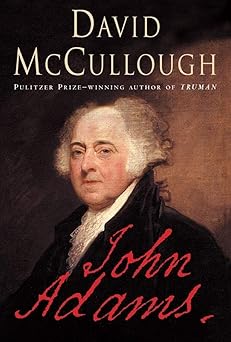
This book had been sitting on my shelf for a long time, so long that I've completely forgotten how, when, or why I got it. But it eventually worked its way to the top of the non-fiction pile of my book-picking system. The main text is a hefty 651 pages, which factors nicely into a 21-day reading schedule of 31 pages/day.
It's really pretty good. As you might expect, given that it won the Pulitzer back in 2002. The author, David McCullough, performed a massive amount of scholarship, digging through primary documents of the era, and bringing everything to life with his evocative prose.
It's a welcome correction to what I (dimly) remembered from high school US History: Adams was a Bad President who made a direct assault on the Constitution's First Amendment with the Alien and Sedition Acts, but fortunately Thomas Jefferson got in and saved the country.
Not quite. The Acts were four in number, three were simply allowed to expire. Remaining was the "Alien Enemies Act", which did not expire, and was not repealed. And was used in the War of 1812 (against Brits), WWI (against nationals of the "Central Powers"), and WWII (against Germans, Italians, and (mostly) Japanese). And now Trump is using it (so far) to deport Venezuelans.
Anyway: in addition to straight biography, there's a lot of accompanying history that provides the context to Adams' life. He was a tireless advocate for American independence from Britain, at a time when that was far from a sure thing. During the Revolutionary War, he played an important role in getting the French to keep the Brits off balance.
Overall, McCullough lends some balance to the characters of the era. Adams comes off very well, although with persistent flaws of vanity and temper. Current idols Jefferson, Franklin, and Hamilton are taken down a notch or two.
There are a lot of great anecdotes. One of my favorites was a story Ben Franklin told Thomas Jefferson, who was dismayed by the surgery the Continental Congress was performing on his draft of the Declaration of Independence.
[Franklin] had once known a hatter who wished to have a sign made saying John Thompson, Hatter, Makes and Sells hats for ready money, this to be accompanied by a picture of a hat.But the man had chosen first to ask the opinion of friends, with the result that one word after another was removed as superfluous or redundant, until at last the sign was reduced to Thompson's name and the picture of the hat.
Well, I chuckled.
Along the way, I discovered that Adams was not a fan of New Hampshire's John Sullivan (born in Somersworth, just a couple miles up the road from Pun Salad Manor); he was suspected of Loyalist sympathies. (That turned out not to be the case.)
Just one more: in his long and (mostly) happy post-presidential retirement, Adams was a voracious reader. He especially liked this, from a famous Cicero essay:
For as I like a young man in whom there is something of the old […], so I like an old man in whom there is something of the young; and he who follows this maxim, in body will possibly be an old man but he will never be an old man in mind.
And, as an old man myself, I find that to be excellent advice.
![[The Blogger]](/ps/images/barred.jpg)



